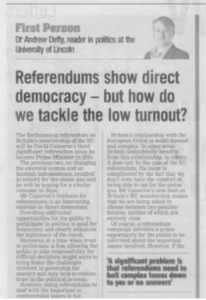This is a slightly extended version of my ‘First Person’ column in The Lincolnshire Echo (Thursday 3 March – Wednesday 9 March edition).
 The forthcoming referendum on Britain’s membership of the EU will be David Cameron’s third significant referendum since he became Prime Minister in 2010. The previous two, on changing the electoral system and on Scottish independence, resulted in victory for the status quo and the Prime Minister will be hoping for a similar outcome in June.
The forthcoming referendum on Britain’s membership of the EU will be David Cameron’s third significant referendum since he became Prime Minister in 2010. The previous two, on changing the electoral system and on Scottish independence, resulted in victory for the status quo and the Prime Minister will be hoping for a similar outcome in June.
Mr Cameron’s fondness for referendums is an interesting exercise in direct democracy. Providing additional opportunities for the public to participate in politics is good for democracy and clearly enhances the legitimacy of the result. Moreover, at a time when trust in politicians is low, allowing the public to take responsibility for difficult decisions might serve to bring home the challenges involved in governing the country and may help to restore trust in the political process.
However, using referendums to deal with the important or controversial issues is not without its pitfalls. While the public like the idea of referendums, on the basis that people generally like to be consulted, this is not always reflected in practice. Turnout in referendums is usually less than in national elections, although the Scottish independence referendum was an exception to this. Low turnout can mean that far from being indicators of national opinion significant decisions can be taken on the basis of relatively small but well organised campaigns.
A more significant problem is that in order to work, referendums need to boil complex issues down to simple yes or no answers. The referendum on electoral reform, for example, offered voters a choice between two, not dissimilar, electoral systems – the Alternative Vote and the current system of first-past-the-post – when there are, of course, many other voting systems which might be adopted. Britain’s relationship with the European Union is multi-layered and complex. In some areas Britain undoubtedly benefits from this relationship, in others it does not. In the case of the EU referendum, the issue is complicated by the fact that we don’t even have the comfort of being able to opt for the status quo. Mr Cameron’s new deal on Britain’s EU membership means that we are being asked to choose between two possible futures, neither of which are entirely clear.
Of course a referendum campaign provides a prime opportunity for the public to be informed about the important issues involved. However, if the last two referendums are anything to go by, the EU referendum campaign will generate more heat than light. There will be competing claims regarding the financial costs of membership and both camps will seek to scare the public about what might happen if Britain leaves or remains in the EU.
The campaign has not got off to a good start with considerable attention focused on personalities rather than issues. This is, in part, an unfortunate consequence of the referendum acting as a proxy for a Conservative leadership contest.
There is also a common, but mistaken, assumption that referendums serve to settle issues. Last year’s referendum on Scottish independence has certainly done little to dampen support for the SNP and the question of Scottish independence is likely to be back on the agenda if Britain leaves the EU against the wishes of Scottish voters. Britain’s relationship with Europe has remained one of the most divisive issues in British politics since the previous referendum in 1975. Whatever the outcome of this year’s referendum it seems unlikely to bring an end to that debate. It is hard to see the losing side quietly conceding defeat. The Conservative Party, in particular is, perhaps irrevocably, split on the issue and irrespective of the outcome there is a good chance that Mr Cameron will not be Prime Minister by the end of the year.
Whatever the limitations, referendums provide exciting opportunities for national debate on issues which matter to all of us. It is to be hoped that this latest exercise in direct democracy will serve to enhance our understanding of the complex issues involved but I am not optimistic.
